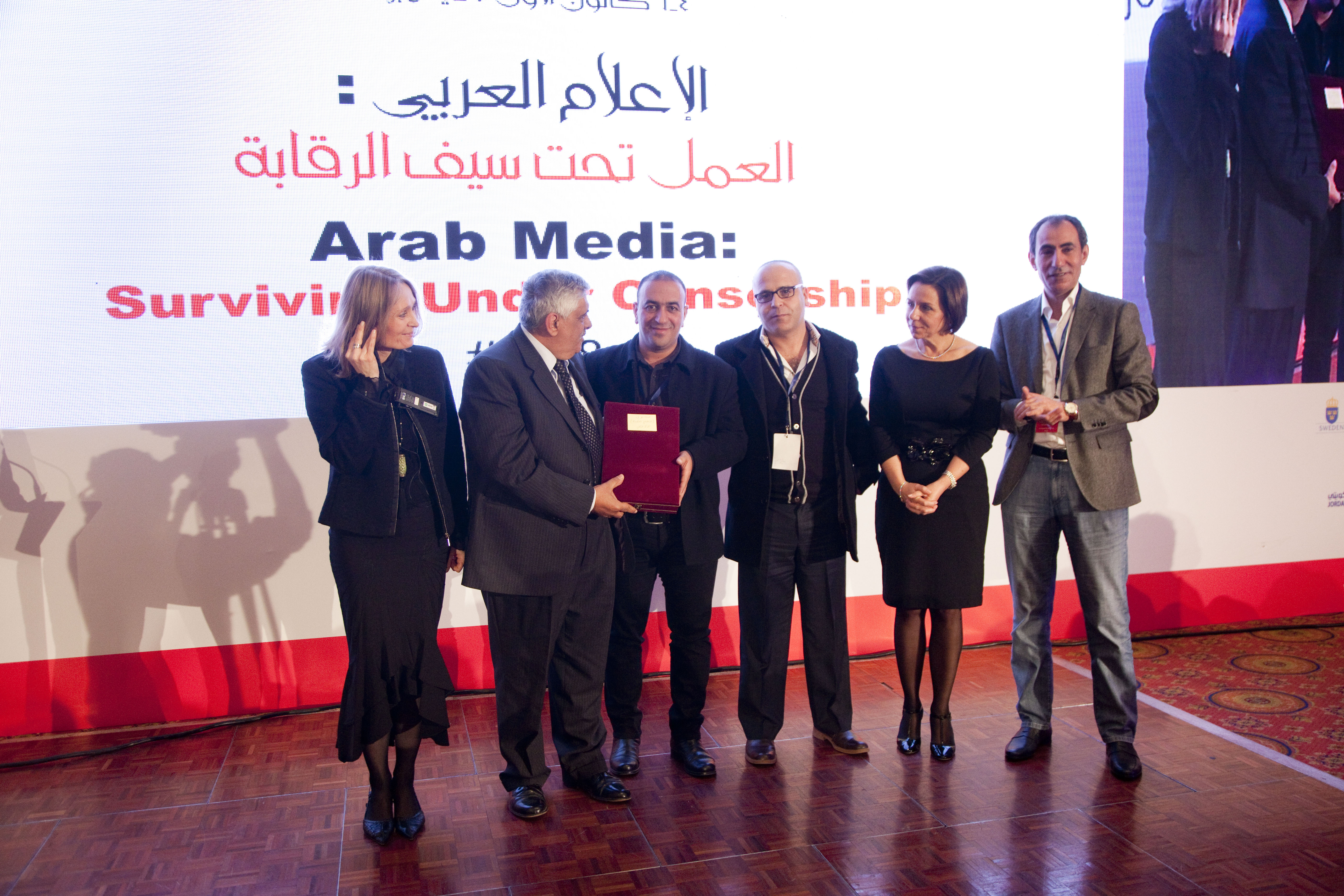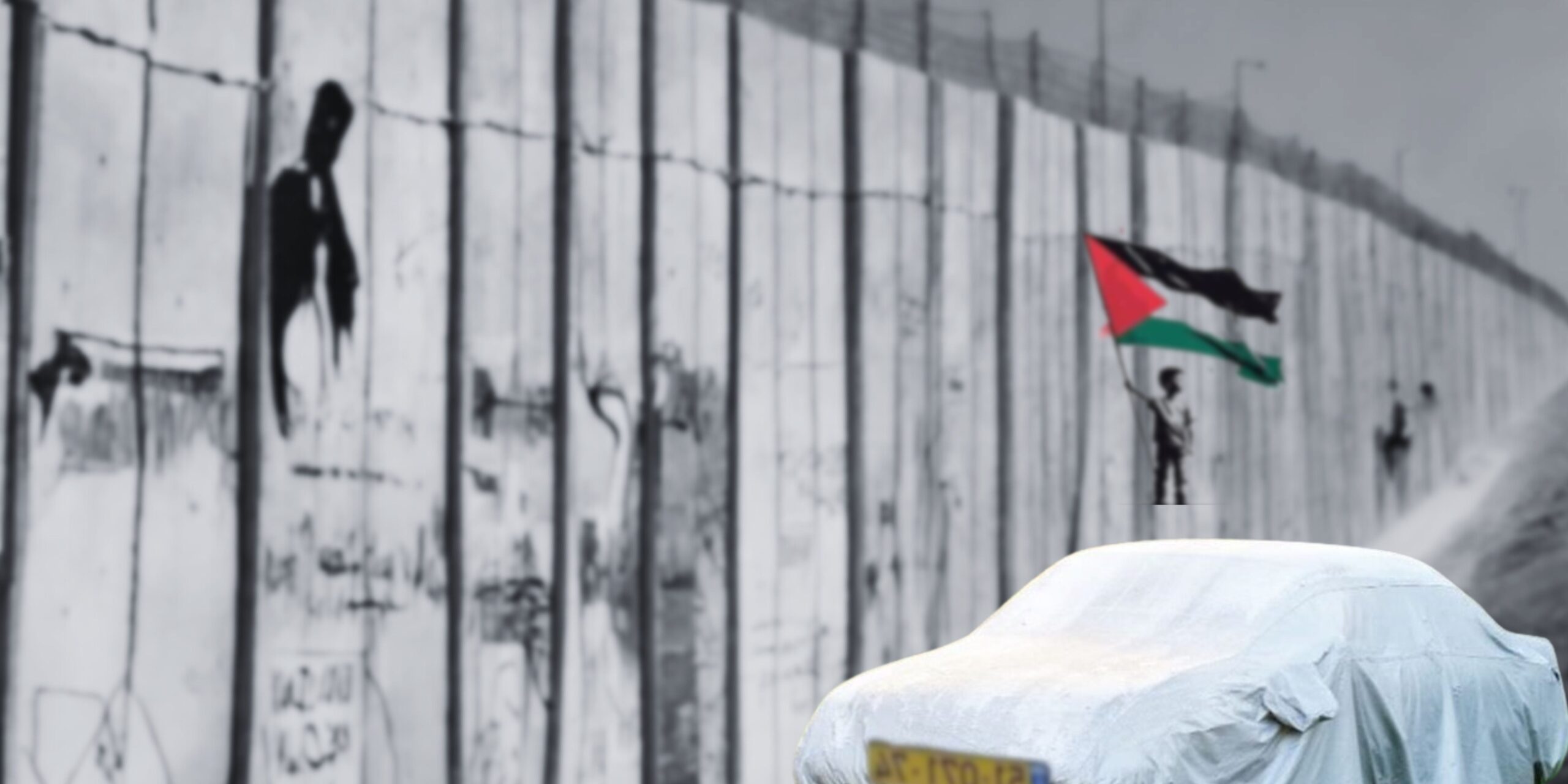Amman, Dec 6, 2015 – Seventeen journalists from Jordan, Iraq, Lebanon, Palestine, Egypt, Tunisia, Yemen and Syria who have exposed a wide range of wrongdoings in their societies – from corruption, fraud and unapproved care for autistic children to abuse of illegal African migrants and torture in jails – have won the 2015 ARIJ Prize for best investigation in print and video categories.
The winners were announced at a gala dinner in Amman, Jordan, on Sunday at the end of the 8th Forum for Arab Investigative Journalists organized by Arab Reporters for Investigative Journalism (ARIJ), the region’s leading media support organization spreading the culture of “accountability journalism” in nine Arab states since 2005. The three-day event, attracting over 300 Arab and international investigative journalists and trainers, was held under the theme “Arab Media: Survival under Censorship”.
Lebanon’s award-winning journalist Riad Kobeissi (Al Jadeed TV, Lebanon) won the first ARIJ prize under the long-form film category (20 minutes plus) for his investigation: “The Diesel Meter in the Era of Horse-driven Fuel Carriages”. After months of filming undercover, he exposed various methods used by companies selling diesel to hospitals and households to manipulate the reading of meters, inflicting thousands of dollars in losses on consumers. Riad confronted the main owner of a workshop manufacturing a special type of meter, and cornered the driver of a fuel truck as he starts manipulating the meter.
The second prize went to Ahmed Soleiman, Egyptian freelancer, for his investigation “Primitive Charcoal” and the third prize went to Jordan’s award-winning reporters Musab Shawabkeh and Hanan Khandakji for “Autistic Children: Victims of Unapproved Centers”. Soleiman documented how a primitive and unlicensed charcoal industry in Aghour el-Ward, a region once known for its scented roses, has turned the area into an environmental hot spot, endangering the health of citizens and the natural eco system. The duo Shwabkeh-Khandakji exposed five centers in Amman offering unapproved oxygen therapy to treat autistic children. Their investigation showed how doctors running these centers are not members in the Jordan Medial Association and force desperate parents to commit to 90 treatment sessions for an average cost of 7,000 dinars ($10,000) in vain.
The first prize in the short-form Film Category (under 20 minutes) went to “Eagle Stamp” by Sameh Laboudi (Egypt), who documented how officials manning local health ministry offices in charge of registering births and deaths in Egypt are able to use loopholes in the national archives to manipulate these certificates.
Second came Palestinian duo Karim Asakreh and Bassam Elroumi for “Hydro: Death Sentence Covered by Law”. They tracked the trail of Hydro, a popular new drug marketed in Palestine to the young and old, as performance enhancing drugs. The substance enters across porous border controls and is sold under various names and packages, each appealing to a special age group, especially school children and university students.
“Caravan” by Yunis al-Bayati from Iraq won third prize. In his investigation, he exposed how the governor of Diyala awarded a contract to import caravans to house thousands of citizens displaced in 2013 by ISIS to companies close to his family members. Under the contract, caravans were bought at twice the price of standard prices and lacked basic services, compounded the misery of the displaced and wasted public funds allocated for easing the suffering of those who had to flee their homes to escape death at the hands of ISIS and other militant groups.
Under the short-form film category, the jury committee decided to give three “certificates of appreciation” for hard work and dedication to Osama Deeb (Egypt) for “Forbidden Joy”, Humam Mujahed (Egypt) for “Playing on a Moving Chair” and to Iraq’s Assad Zalzali for “The Devil’s Trade”.
In the print category, first prize went to Ali Salem for his investigation “Yemen: African Immigrants’ Graveyard”. In his two-year investigation, Salem documented the practices of gangs operating in the Western coastal area, between the governorates of Taiz in the south and Hajjah in the North, who detain for ransom illegal African immigrants trying to enter Saudi Arabia. These gangs make use of weak cooperation between various police forces and loopholes in a judicial system that is unable to hold to account culprits detaining the survivors of death.
The award for second place was shared by journalists Sami Shahrour (alias name) for “Syria’s Kidnaping Business” and Egypt’s Saadah Abd-Wlqader for “Death by Remote Control”.
Shahrour spent three years investigating how random kidnappings in his war-torn country have turned into a business at the hands of members of the police forces or others linked to security structures seeking quick profits or wanting to break citizens described as opponents of the regime. Award-winning investigative journalist Abd-Elqader documents how walkie-talkies are illegally imported into Egypt and sold in the heart of the capital Cairo taking advantage of weak control by the Interior Ministry, the National Bureau for Organizing Telecommunications and the Customs Department.
In print, the third prize went to Seham El Basha and Ahmad Jamal Eddine (Egypt) for “Judicial Titles for Sale”. They documented how International Mediation Centers in Egypt run three-day training courses and give attendants certificates bearing diplomatic or arbitration titles similar to those used in the country in return for a fee of 1200 Egyptian Pounds each in violation of the 1994 Mediation Law.
Under the print category, the jury committee decided to give one “certificates of appreciation” for hard work and dedication to Mohammad Komani from Yemen for his investigation: “Yemen’s Street Beggars”
Two special ARIJ Board Prizes, one for exposing human rights and the other for uncovering corruption and organized crime went to Tunisian freelancer Meriam Nasri and Syria’s Ibrahim Saleh (alias name) respectively.
Nasri’s film, shown on Al Jazeera English’s People & Power investigations program in September, proved that despite the country’s new democratic institutions since the 2011 revolution, police brutality and torture continued unabated. Saleh’s investigation “The Secret Empire of Al-Assad’s Maternal Family” was completed under ARIJ’s cooperation agreement with the International Consortium for Investigative Journalists (ICIJ) program known as HSBC’s Swissleaks.
Walid Batrawi, head of the 2015 ARIJ Jury Committee, said this year’s selection process was challenging. “The nominations we looked at were cutting-edge and of very high professional caliber. The differences were sometimes less than 0.010% but at the end we had to distinguish some against others,” he said. “Many of the short and long-form films we examined contained visual proof to support the initial hypothesis of each investigation. This was a key factor taken into consideration by the jury members”.
“Undoubtedly, the culture of investigative journalism and in-depth features has become widespread among partner organizations and ARIJ should be credited for that as year after year, the organization shows its resilience and ability to distinguish itself and to support creativity”.
Ends









Leave a Reply